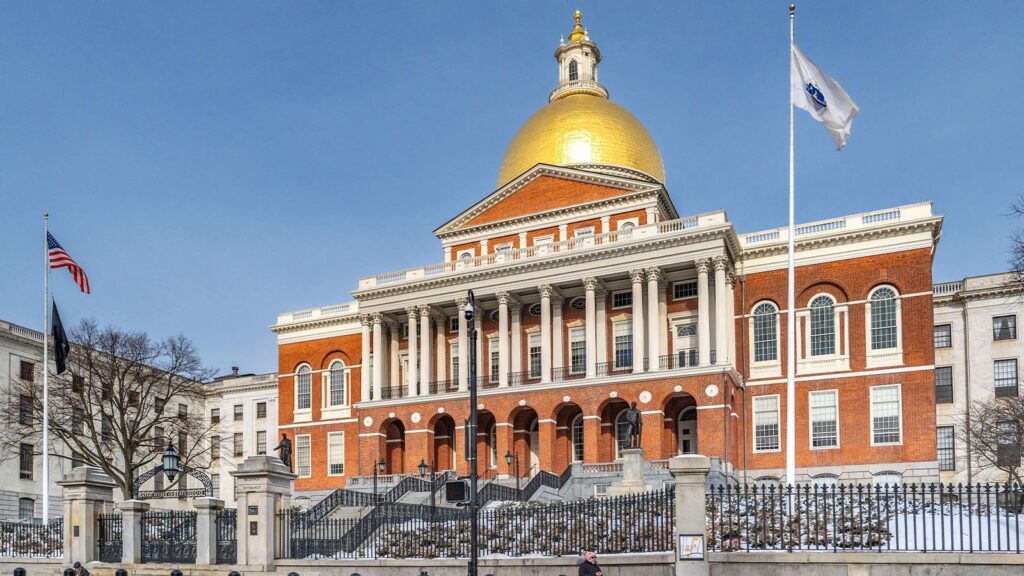Massachusetts Sports Betting: Legislation Would Ban Prop Bets, Curb Ads, Raise Taxes

Promo Code: BOOKIES
Must be 21+ to participate (18+ in KY). Gambling problem? Call 1-800-GAMBLER (CO, IL, IA, KY, KS, LA, MD, MO, NC, NJ, OH, PA, TN, VA). Call 1-800-NEXT-STEP (AZ). Call 1-800-9-WITH-IT (IN). CALL 1-877-770-STOP (LA). Must be present in LA (select parishes). Licensee partner Amelia Belle Casino. Minimum $10 deposit required. Minimum odds -500 or greater. Bonus Bets wager excluded from returns. New customers only. T&Cs, time limits and exclusions apply.
Proposed legislation in Massachusetts would eliminate in-play and prop betting, ban sports betting ads during games, and raise the tax rate paid by online operators to 51%, all in the name of "public health."
The Bettor Health Act, written by State Sen. John F. Keenan, would impose the among the strictest limits on legal sports betting on Operators in Massachusetts. Among its provisions.
- Raise the online sports betting tax rate from 20% to 51%.
- Ban betting ads during live sporting events and prohibit ads that misrepresent a customer’s odds of winning.
- Require operators to double their contributions to the Commonwealth’s Public Health Trust Fund, which supports gambling addiction treatment.
- Prohibit employee compensation based on how much they convince customers to wager.
- Ban “in-play” and “proposition” bets.
- Add sports agents and promoters to the list of those banned from betting on sporting events.
- Require affordability checks to limit daily betting unless customers prove sufficient funds.
- Direct the Massachusetts Gaming Commission to research links between problem gambling and suicide.
- Require operators to provide anonymized customer betting data, including amounts and frequency.
Public Briefing and Stakeholder Feedback
Rep. Adam Scanlon and Sen. Keenan held a public briefing Wednesday at Beacon Hill, coinciding with Problem Gambling Awareness Month. Attendees included Massachusetts Gaming Commission Chair Jordan Maynard, addiction specialists, industry representatives from the Sports Betting Alliance, and members of the public.
The MGC has not taken a formal stance on Keenan's legislation, Chair Maynard expressed appreciation for the dialogue in a statement to bookies.com:
The Commission’s goal is to maximize benefits and minimize the potential harms of casino gaming, sports wagering, and horse racing… I look forward to more reports being released, specifically on sports wagering and the impact on young people.
Sen. Keenan Expresses 'Public Health' Concerns
Speaking with bookies.com after the public briefing, Keenan outlined the motivation behind his bill:
‘Similar’ To The Opioid Epidemic
- Keenan believes legal sports betting has had a negative impact on Massachusetts since its launch, particularly due to aggressive advertising and the emergence of gambling addiction. Massachusetts has generated more than $250 million in state revenue from sports betting since it launched in 2023. While Keenan does not oppose sports betting in principle, he said the overall negative impact of sports betting on the Commonwealth could soon outweigh the revenue it generates.
I don't think that we have put the regulation regulations in place that are needed to address what is I think going to be a public health problem . . . Those impacts will only get worse. And unless we put guide rails in place, then the money that's generated won't be enough to deal with the society of harms.
- Keenan draws strong parallels to the opioid epidemic, noting that both industries marketed what he terms “addictive products” as safe and placed blame on individuals when problems arose.
Some of the things that we’re seeing now are pretty similar to what we saw in the early stages of the opioid epidemic.
Bill's Focus: Advertising, Addiction, and Player Safety
Keenan highlights several concerns he believes are addressed by the Bettor Health Act. Chief among them are:
1. Advertising
What I hear from the public is that the advertising is overwhelming and intrusive, and we have to do something about it.
Keenan raises concerns about children being exposed to ads during games and how marketing affects people in recovery.
2. Addiction and Public Health
We hear from the industry that if you’re responsible, you can participate — And that if you develop a problem, that must mean that you are irresponsible as an as an individual.
Keenan sees a fundamental flaw in how the industry addresses the issue of responsible gaming and argues this shifts blame to individuals while downplaying the industry’s role in addiction. He highlights the lack of infrastructure to support individuals with gambling addiction.
3. In-Play and Prop Bets
They’ve been described to me as the crack cocaine of sports betting.
He cites harassment of athletes and coaches tied to these types of bets. And this ad that has aired during the NCAA Tournament.
The NCAA has released an ad for March Madness discouraging sports bettors from abusing athletes:"Only a loser would harass college athletes after losing a bet."Over $3.1 billion is expected to be bet on men's and women's March Madness at U.S. sportsbooks. pic.twitter.com/X3Sx4GjuFK— Front Office Sports (@FOS) March 21, 2025
Keenan's Message to Industry Leaders & Other Thoughts
Keenan was asked what he would tell executives at DraftKings, FanDuel, Fanatics, and other leading sports books:
Shift your focus from ‘responsible gambling’ to treating this as a public health issue that should be properly regulated. I go back to Oxycontin and Purdue pharma, they made a conscious decision when they were challenged to stigmatize those who were addicted to their product.
He sees a similar pattern in operators putting the onus on players and not themselves. Someone is said to have a gambling problem because they are not responsible, “not because you were hit with deceptive advertising. Not because you had a host calling you, trying to entice you to make bigger bets, and not because gambling has been so normalized," he says.
They should ban in play in proposition bets. They should watch their advertising. They pay the Commonwealth a higher rate (51% vs. 20% now) consent with what depending in New Hampshire, Rhode Island and New York. Those states have not seen the platforms run away.”
He also criticizes platforms for actively trying to re-engage high-end users who stop betting, likening it to a bar calling someone in recovery.
This industry doesn’t offer you a Coke and a hot dog when you're losing — they call you and say, ‘Hey, how do you like the Celtics tonight?’
On Regulation and Market Competition
Keenan isn’t concerned that a higher tax rate or stricter rules would harm competition:
I’m not so sure competition works to the benefit of the consumer here… I think it would make the product even more ubiquitous.
Chances of the Bill Passing
Keenan filed a similar bill last year focused on taxation, which didn’t reach a full vote in the Senate. He admits it may take multiple sessions but believes momentum is growing:
It’s not just legislators — it’s public health officials, parents, people who’ve bet before and are concerned.
We’re seeing more people with gambling issues every day. It’s time to act now — before this becomes a full-blown public health crisis.
About the Author

Bill Speros is an award-winning journalist and editor whose career includes stops at USA Today Sports Network / Golfweek, Cox Media, ESPN, Orlando Sentinel and Denver Post.

 Massachusetts Set To Formally Approve First-In-The-Nation Rules On Player Limits
Massachusetts Set To Formally Approve First-In-The-Nation Rules On Player Limits  Hard Rock Bet Promo Code: Get 10x 100% Profit Boost Tokens Up To $50 Max Bet Per Token (Feb. 26)
Hard Rock Bet Promo Code: Get 10x 100% Profit Boost Tokens Up To $50 Max Bet Per Token (Feb. 26)  Best UK Casino Games at Online Casinos February 2026 | Online Casino Games
Best UK Casino Games at Online Casinos February 2026 | Online Casino Games  Starburst Free Spins Offers & Starburst Slot Machine & Slingo February 2026
Starburst Free Spins Offers & Starburst Slot Machine & Slingo February 2026  Betrino Casino Promo Code February 2026 - 100% Welcome Bonus Up To £50 & 20 Free Spins
Betrino Casino Promo Code February 2026 - 100% Welcome Bonus Up To £50 & 20 Free Spins  Crown Coins Casino Review February 2026 - Crown Coins Casino Promo Code & App Rated
Crown Coins Casino Review February 2026 - Crown Coins Casino Promo Code & App Rated
Comments